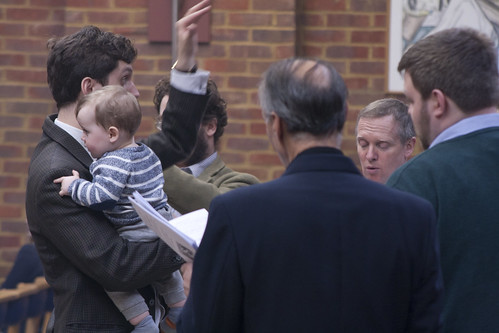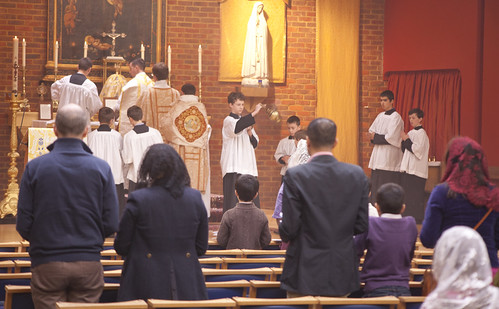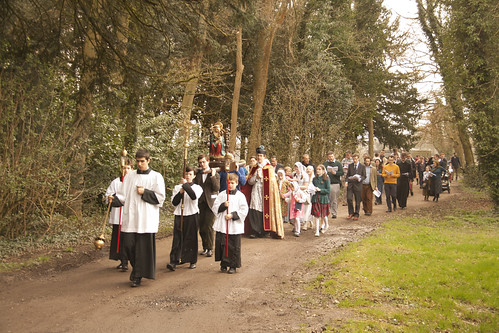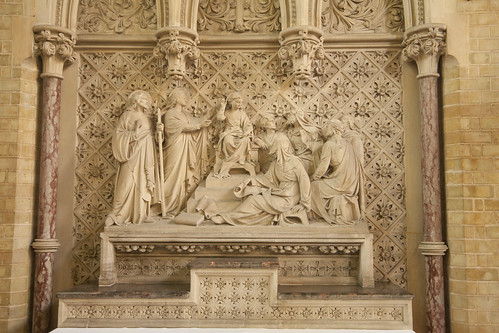Chairman's Blog
Priest attacked for wearing a clerical collar
A recent LifeSite article by me. It begins:
Cardinal Marx on Celibacy
A recent LifeSite article of mine. It begins:
Re re-print: the Parish Ritual
Cross-posted from Rorate Caeli.
Preserving Christian Publications has brought out a beautiful reprint of a book once almost as essential to the work of a priest as the Missal or Breviary: the Parish Ritual.
Published in the USA in 1962, it is the equivalent to the Small Ritual published in England in 1964. It is an extract from the Missal and the Roman Ritual, containing the texts needed by a priest for weddings, baptisms, and funerals, Extreme Unction, receptions of converts, and a large number of blessings (of Rosaries, the Miraculous Medal, Holy Water, etc. etc.), all in a handy format worthy of use in the liturgy itself.
One of the useful features of the book is that although all the Latin texts have a translation on the same page, a clear distinction is made between what, under the rules in force in 1962, must be said in Latin, and what can be said in English.
Preserving Christian Publications has not just scanned in an old copy. The whole book is reset, including the chants where applicable, bound in strong but flexible leatherette, with a reading ribbon and gilt pages, with good quality paper and rounded corners.
Even more important, they have replaced the Pian psalms with the ancient psalter wherever necessary. The Pian Psalter, created by Augusin (later, Cardinal) Bea, was a Latin translation of the Psalter in a supposedly more Classical Latin style. The whole idea was absurd, and unnecessarily distances the user from the words used by the Fathers and Doctors. It was criticised, implicitly, by the Second Vatican Council (for more on all this see here). But it was officially endorsed when it came out in 1945, and started appearing in liturgical books, though never made compulsory in the Office or the Roman Ritual.
 In my copy of the Small Ritual the older psalms are given as an option, in an appendix. This is obviously far from convenient, and Preserving Christian Publications has simply put them back into the main text.
In my copy of the Small Ritual the older psalms are given as an option, in an appendix. This is obviously far from convenient, and Preserving Christian Publications has simply put them back into the main text.
This book makes an ideal present for priests. If they are working outside the United States, they will need to be aware of US-specific customs in a few places, but notwithstanding that the book will be useful throughout the English-speaking world.
Since all priests have the right to use the blessings and sacramental forms in this book, it could even be of interest to a priest does does not yet celebrate the Traditional Mass, but would like to put a toe in the water with a legitimate alternative to the much-criticised post Vatican II 'Book of Blessings'.
You can buy it direct from the publishers here or from Amazon.com here.
Calx Mariae on Sex Education in Schools
Calx Mariae is an impressive publication, with some very distinguished contributors: this issue has articles by Prof Roberto de Mattei and Duke von Oldenburg.
My article begins:
I confess I am a reluctant home-schooler. I do not believe that schools are intrinsically problematic, or that formal education is bad. Clearly they have their limitations in trying to cater for the individual needs, interests, and abilities of a room-full of children, but in principle they also have many advantages: the specialisation and therefore expertise of the teachers, the sharing of resources, and the interactions and group projects, from sports to drama, of the children. If I were living in any other era where schools existed, I would be sending my children to them. So what is the problem today?
The headline issue has long been sex education, known as PHSE (‘Personal, Social, and Health Education’). Long ago I came to the conclusion that I would be wrongly abdicating my responsibility as a father if I allowed my children to be subjected to the teaching materials used in these lessons with the approval of the state and, in many cases, of the Catholic bishops. Text-books, lesson plans, ‘teachers’ resources’, and videos for showing to children as young as five are not difficult to find online, although teachers themselves can be understandably reluctant to show parents what they are using. Many parents seem to prefer to remain in ignorance.
Formal sex education classes are, however, just one manifestation of the problem with education today, and it would be besides the point, even where it is possible, to withdraw one’s children from those lessons alone. The deeper problem is two-fold. First, the state and the educational establishment has decided that the cultural and moral education of children is a matter for them, and not for parents; second, they have simultaneously lost all confidence in traditional Western culture and morality.
Support the Latin Mass Society
Chant Training Weekend, 5-7th April, now booking
Booking open for the Gregorian Chant Network Chant Training Weekend |
5-7th April
Oratory School, Woodcote, near Reading RG8 0PJ
|
We need better bishops, not (just) better procedures
My latest on LifeSite.
Family Retreat: booking now
Booking is open: go to the SCT website.
As the name implies, in organisation and pricing it is adapted for families, with children. Unaccompanied adults are very welcome as well.
This year it will be led by Fr Konrad Loewenstein and Fr Seth Phipps of the Fraternity of St Peter. The theme is the Angels.
Don't miss out on this unique event. The Gregorian Chant Network's Training Weekend runs alongside: see the same page for information and booking.
Support the Latin Mass Society
Felt banners and participation
My latest for LifeSiteNews.
Survey of US Traditional Catholics
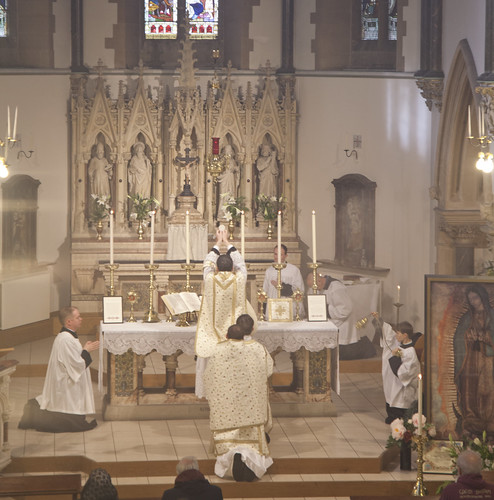 |
| LMS Pilgrimage to Our Lady of Guadalupe, in the Church of St Joseph, Bedford |
I have a piece in LifeSiteNews on this widely-reported survey, which says exactly what one would expect: Catholics attached to the Traditional Mass overwhelmingly believe the teachings of the Church and fulfill their obligations to attend Mass and go to confession.
I think the survey is a good effort, but I'd like to put its contrast with data from other surveys on the beliefs and practices of Catholics as a whole into some context, beyond what I wrote for LifeSite.
Conservative Catholics reading the period results of mainstream Catholic opinion and
practice may get the feeling that the findings exceed their most pessimistic estimate of their
co-religionists. Amazingly few Catholics appear to know, let alone confess, the teaching of the Church on the Real Presence; scarcely any actually follow the Church’s teaching on contraception.
One reason for this is poor methodology in the surveys themselves. Notoriously, one survey
which claimed that almost no Catholics accepted the Church’s ban on contraception arrived at this conclusion by excluding from consideration various categories of women; with other flaws, this made the survey pretty worthless.
Even the respected research institute attached to Georgetown University, CARA, tends to survey ‘self-identified’ Catholics instead of Church-going Catholics. But what does it mean to ‘identify’ as a Catholic while rejecting all her teachings and never going to Church? The results of surveys including this category will reflect how many such people there are; how many there are in turn depends not only on the rate of lapsation and poor formation, but in the strength of the idea that one can be a ‘Catholic’ in some tribal sense completely unconnected with belief and practice.
Interestingly, in Britain a recent academic study showed that Anglicans are very happy to keep calling themselves Anglicans when they have lapsed, while Baptists stop calling themselves Baptists if they aren’t fully committed. The attitude of Catholics falls between these extremes. A less complete study would have suggested that Baptists are far more committed than Anglicans, but also more likely to lapse, which would have been misleading: in effect it compared committed Baptists and uncommitted Anglicans.
What this survey of church-going Catholics, attached to the ancient Latin liturgy, shows is that, within the undifferentiated mass of ‘Catholics’ who have a confusingly wide range of views and religious practices, there is at least one sub-group which is genuinely faithful to the Church, her teachings and requirements, and who average a reasonable number of children to whom this Faith can be passed on.
In the meantime, we should be grateful that serious statistical study of Latin Mass-going Catholics has finally begun.
Fr Andrew Pinsent to speak Friday 22nd in London
|
Fri 22 Iota Unam talk, Fr Andrew Pinsent: 'The Traditional Mass and the Formation of the Virtues' 7pm in the basement at Our Lady of the Assumption, Warwick Street.
Doors open at 6:30pm
All welcome. £5 on the door.
Our Lady of the Assumption and St Gregory
Warwick Street LONDON, W1B 5LZ The talk will be preceded by drinks and followed by questions and a recitation of Compline of the Little Office of the Blessed Virgin Mary.
Fr Andrew Pinsent has doctorates in both Physics and in Philosophy, as well as theological training, and is Director of the Allan Ramsey Centre in Oxford University.
This is the second of the Iota Unum series of talks, which will focus on topics connected with the everyday life of traditionally-minded Catholics: the domestic church, homeschooling, traditional catechesis, moral instruction, culture (high, common, and religious), religious history etc..
The purpose of the talks is not only to inform but to help traditionally-minded Catholics from across London and beyond to meet, discuss matters of mutual concern, and form a greater sense of community.
There will be a charge of £5 on the door to cover refreshments and other expenses.
|
Other events coming up in London |
|
March
Wed 6: Ash Wednesday Mon 11: Houghton Schola at Maiden Lane, Feria of Lent Sat 9: St Tarcisius server training Day/ Guild of St Clare Vestment Mending Day Sat 16: LMS Pilgrimage to Caversham: Ember Day. Mass 11:30am with polyphony Mon 18: Cantus Magnus Polyphonic Mass at Maiden Lane, St Cyril of Jerusalem Fri 22: Juventutem Mass at St Mary Moorfields, 7:30pm Tues 26: Iota Unam talk, Stuart & Clare McCullough ‘The liturgy and crisis pregnancy counselling’ April
Fri 5-7: St Catherine's Trust Family Retreat & Gregorian Chant Network Chant Course Fri-Sun at the Oratory School, Woodcote: see here. |


